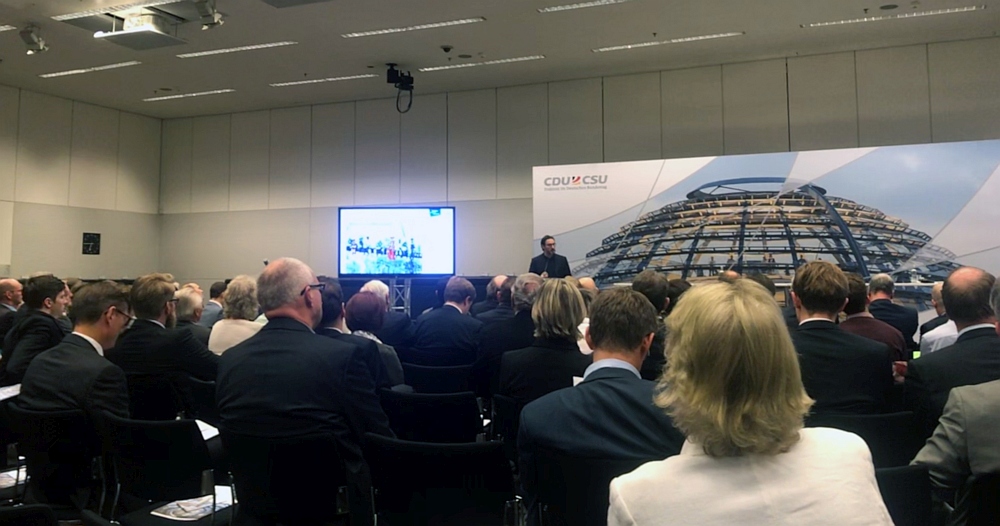Artificial intelligence (AI) will significantly change the world as we know it today. In the past, technological progress has made products lighter, more efficient and more durable; AI is now making everything “smarter” and is therefore becoming an important topic both economically and socially. Stakeholders from science and politics discussed the future of artificial intelligence in Germany and Europe with around 200 interested guests in Berlin last Wednesday. “Technology must serve people” – that was the central message of the congress “Artificial intelligence – prospects for society and the state”.
Prof. Sami Haddadin, Director of the Munich School of Robotics and Machine Intelligence (TU Munich), explained that developments in the field of AI have now reached the point where they are leaving the screen and manifesting themselves in the physical world. Due to its reservoir of good electrical engineers and computer scientists, Germany is a particularly suitable location for the development of machine intelligence, a symbiosis of AI and robotics that combines mechatronics, programming and networking. The aim is to develop sensitive robots with fine motor skills. These can be used in industrial production, but also for care tasks, e-health applications or as personal assistance systems.
During the event, Helge Braun, Head of the Federal Chancellery, gave an outlook on the German government’s AI strategy, which is to be presented in the course of the coming week. It is intended to make artificial intelligence a successful topic in Germany. Some factors are particularly important here:
- Data availability: AI and, in particular, machine learning, which is currently being used frequently, require a lot of data. How this can be collected and shared efficiently without violating personal rights is a key question when shaping the future with artificial intelligence.
- Economic exploitation and networking: The development of a science and start-up community with an AI focus is essential. Germany is well positioned in terms of cutting-edge research. “It is important to disseminate this knowledge and make it applicable for the economy,” explains Prof. Philipp Slusallek, Scientific Director at the German Research Center for Artificial Intelligence. Start-ups, but also medium-sized companies and industry, need to be supported here.
- Skilled workers: Increased education and training in the field of AI and the retention of skilled workers are essential for the future viability of Germany and Europe. Education must enable people to carry out plausibility checks, i.e. to classify certain results. It is therefore the basis for the sensible use of AI. Improvements must be made not only at universities, but also at vocational schools and in the area of further education and lifelong learning. “It has to start at school,” says Prof. Christoph Meinel (Director and CEO of the Hasso Plattner Institute). In line with this, Prof. Jörg-Müller Lietzkow, spokesperson for cnetz and professor at the Institute for Media Studies at the University of Paderborn, is calling for all pupils to learn the basics of algorithms and how to work with data, such as arithmetic and writing.
- Regulation: Compared to China or the USA in particular, Germany is very strict when it comes to regulation and data protection. With a view to exploiting the potential of artificial intelligence, it is currently more a question of carefully lifting regulatory barriers – where it makes sense. Helge Braun: “We need to create freedom” for science and business without restricting personal rights.
- Social acceptance: Scepticism towards technology is an obstacle to research and development in the field of artificial intelligence. It is important to reach out to citizens, show them the benefits of AI and clarify the European goal of a human-centered, controlled and safe use of artificial intelligence. In the coming months and years, all stakeholders will have to address moral and ethical issues, develop guidelines and set clear boundaries. This must also be discussed internationally.
Prof. Sami Haddadin presented one of his current projects at the congress: a model community for geriatronics in Garmisch-Patenkirchen. A care home is currently being built there in which assistance robots will make life easier for older people. Scientists are working on improving the intelligent machines at the associated research center. This is just one example that shows where the journey is heading. Whether health, mobility, work or leisure – artificial intelligence is already changing our lives massively. Used sensibly and appropriately, it can make the future smarter and more liveable, as well as saving costs and creating jobs.
Photo: Prof. Dr. Sami Haddadin (Director of the Munich School of Robotics and Machine Intelligence, TU Munich) during his keynote speech at the congress “Artificial Intelligence – Perspectives for Society and the State”. Berlin, November 7, 2018.
Photo credit: aconium GmbH

